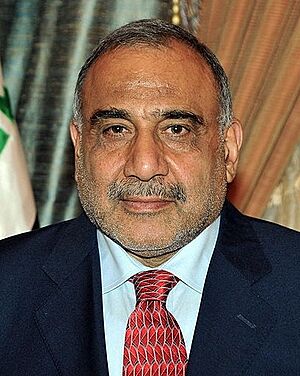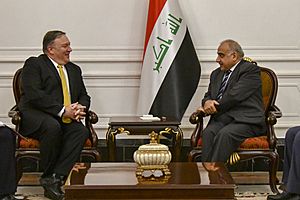Adil Abdul-Mahdi facts for kids
Quick facts for kids
Adil Abdul-Mahdi
|
|
|---|---|
| عادل عبد المهدي | |

Abdul-Mahdi in 2008
|
|
| Prime Minister of Iraq | |
| In office 25 October 2018 – 7 May 2020 |
|
| President | Barham Salih |
| Deputy |
|
| Preceded by | Haider al-Abadi |
| Succeeded by | Mustafa Al-Kadhimi |
| Minister of Oil | |
| In office 8 September 2014 – 19 July 2016 |
|
| Prime Minister | Haider al-Abadi |
| Preceded by | Abdul Karim Luaibi |
| Succeeded by | Jabbar Alluaibi |
| Vice President of Iraq | |
| In office 7 April 2005 – 11 July 2011 Serving with Ghazi al-Yawer (until 2006) and Tariq al-Hashimi (after 2006)
|
|
| President | Jalal Talabani |
| Preceded by | Rowsch Shaways |
| Succeeded by | Tariq al-Hashimi |
| Minister of Finance | |
| In office 2 June 2004 – 6 April 2005 |
|
| Prime Minister | Ayad Allawi |
| Preceded by | Kamel al-Kilani |
| Succeeded by | Ali Allawi |
| Personal details | |
| Born |
Adil Abdul-Mahdi al-Muntafiki
1 January 1942 Baghdad, Kingdom of Iraq |
| Political party | Independent (since 2017) SCIRI (1982–2017) Iraqi Communist (1970s) |
| Spouse | Rajah |
| Alma mater | |
Adil Abdul-Mahdi al-Muntafiki (born January 1, 1942) is an Iraqi politician and economist. He served as the Prime Minister of Iraq from October 2018 to May 2020. Before becoming prime minister, he held several other important jobs. He was one of the Vice Presidents of Iraq from 2005 to 2011. He also served as the Minister of Finance and the Minister of Oil.
Abdul-Mahdi was a member of a powerful political party called the Supreme Islamic Iraqi Council (SIIC). This group was based in the neighboring country of Iran for a long time. They worked with other groups, including the Kurds, to oppose the government of Saddam Hussein.
In November 2019, Abdul-Mahdi announced he would resign as prime minister. This happened after large protests across the country against the government.
Contents
Early Life and Education
Adil Abdul-Mahdi was born in Baghdad in 1942. His father was a respected Shiite religious leader, or cleric, who had been the Minister of Education in Iraq. His mother was from Syria. He went to a well-known high school in Baghdad run by American Jesuits.
After high school, he studied at Baghdad University. He earned a degree in economics in 1963. For a short time, he worked for Iraq's foreign ministry.
In 1969, he moved to France. There, he worked for research groups and edited magazines. He continued his education in France, earning a master's degree and later a PhD in economics. Abdul-Mahdi became a French citizen and returned to Iraq in 2003 after Saddam Hussein's government was removed.
Political Career
In the 1970s, Abdul-Mahdi was part of the Iraqi Communist Party. This party had different groups with different ideas. Abdul-Mahdi was part of a group that did not want to work with the military governments ruling Iraq at the time.
Over time, his political views changed. He became interested in Islamic ideas from Iran. He joined the Supreme Council for the Islamic Revolution in Iraq. This was a political party made up of Iraqis who were living outside of Iraq. It was formed in Iran in 1982.
Vice President of Iraq
After returning to Iraq, Abdul-Mahdi became a major political figure. In 2005, he was elected as one of Iraq's Vice Presidents.
In 2006, he was considered for the job of Prime Minister but another politician, Nouri al-Maliki, was chosen instead. Abdul-Mahdi was then re-elected as Vice President.
On February 26, 2007, he survived an assassination attempt that killed ten other people. In 2009, his bodyguards were involved in a serious bank robbery in Baghdad. He resigned as vice president in 2011.
Minister of Oil
From 2014 to 2016, Abdul-Mahdi served as Iraq's Minister of Oil. This is a very important job in Iraq because the country's economy depends heavily on oil exports.
Prime Minister of Iraq
On October 2, 2018, Iraq's president, Barham Salih, chose Abdul-Mahdi to be the new Prime Minister. He officially took office on October 25, 2018.
In April 2019, Abdul-Mahdi visited Germany and met with Chancellor Angela Merkel. He announced a $14 billion plan to improve Iraq's electricity system. He planned to work with the German company Siemens on this project. Germany also promised to help Iraq with its economy and security.
Resignation
In late 2019, large protests began in Iraq. People were unhappy with the government and the difficult living conditions. On November 29, 2019, Prime Minister Abdul-Mahdi announced that he would resign. The Iraqi parliament officially accepted his resignation on December 1, 2019. He stayed in the role as a caretaker prime minister until a new government was formed in May 2020.
See also
 In Spanish: Adil Abdul-Mahdi para niños
In Spanish: Adil Abdul-Mahdi para niños
 | John T. Biggers |
 | Thomas Blackshear |
 | Mark Bradford |
 | Beverly Buchanan |


